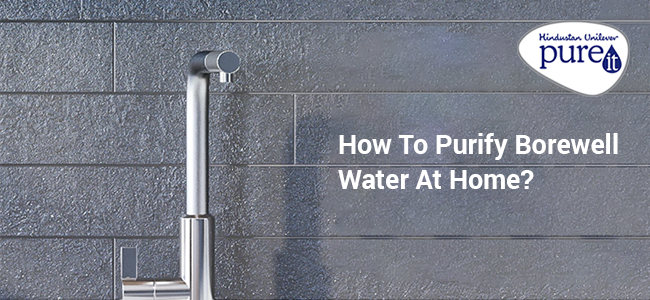How to purify borewell water at home?
Jul 16, 2021
iCrowdMarketing powered by iCrowdNewswire

Borewells water is nothing but the rainwater that seeps deep into the ground and gets trapped between the rock layers. As for the level of contamination, it depends on how deep the borewell is. If the bore is deep, then there is less contamination as the water is protected by layers of rock. If it is shallow, then the scope for contamination is huge indeed.
Borewell water or groundwater happens to be a very common source of water for Indians. In fact, 60% of the rural households and 20% of the urban households in India depend on borewells for drinking water, according to a popular body of research.
Most of us think borewell water is hard water and do not think of purifying it unless it is visibly contaminated. In fact, according to the WHO, hard water is not dangerous to health. It might come as a surprise, but this organization actually considers hard water a naturally occurring mineral supplement.
However, hard water is not good for your home as it causes stains and scaling. It is not good for you either, as it can cause itchy hair and scalp. But you may say that if borewell water is hard water, we can use a water softener. For this reason, let’s explore the nuances.
What is hard water?
According to Wikipedia, hard water is water that has high mineral content. Hard water is formed when water percolates through deposits of limestone, chalk, or gypsum which are largely made up of calcium and magnesium carbonates, bicarbonates, and sulfates. When the water supply of your home has a high total Dissolved Solids quotient, it is considered hard water. An easy way to identify if your water supply is hard water is to see if your soap lathers easily with the water. Soap doesn’t lather well with hard water. Other tell-tale signs are scaling on utensils, stains on the floor, itchy skin, and rough hair.
What is water softening?
If borewell water is just hard water, you can use a water softener for your home. Water softening is the removal of calcium, magnesium, and certain other metal cations in hard water. The resulting soft water requires less soap for the same cleaning effort, as soap is not wasted bonding with calcium ions. Soft water also extends the lifetime of plumbing by reducing or eliminating scale build-up in pipes and fittings. Water softening is usually achieved using lime softening or ion-exchange resins.
What is the difference between TDS and hard water?
The main difference between TDS and hardness is that TDS include inorganic and organic substances that cannot be filtered through a filter paper whereas hardness is due to the presence of magnesium and calcium salts of carbonate, sulfate, and chloride. Bear in mind that softening hard water does not alter the TDS of water- in fact, it might increase the quotient.
How is hard water different from borewell water?
Borewell water is hard water, no doubt, but it is a lot more than hard water. It contains not just carbonates of Calcium and Magnesium, but also microbial contaminants and heavy metals. Even if you consider borewell water to be just hard water, for softening water for home use, you can drop a softener tablet into your water tank. But how will you purify your drinking water?
What is the optimal solution for purifying borewell water for your home?
Ideally, you should use a water softener to soften the water for cleaning, bathing, and washing in your home. But for purifying borewell water fed into your drinking water tap, you should get an RO water purifier.
An RO purifier eliminates more than 95% of the total dissolved solids, which include organic matter and inorganic salts dissolved in water. RO also eliminates a good number of microbes along with heavy metals. For the complete elimination of microbes, use an RO water purifier that combines the RO module with a UV module. The result is sweet tasting water that is odor-free as opposed to nasty-smelling borewell water that is brackish or salty to taste.
You can opt for a water purifier with a TDS modulator to modulate the number of salts retained in the output water. Or, you can use a mineralizer cartridge to infuse the output of the water purifier with fresh ions and see that your water does not lose its role as a mineral supplement.
Pureit has RO water purifiers that are easily amongst the best water purifiers in India. Read on to learn about the best water purifier in India.